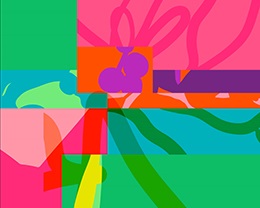20 May 2019
 If I say hedonism…what’s your first response?
If I say hedonism…what’s your first response?
Is it all about sensual self-indulgence, the pursuit of pleasure over all else, displaying a selfish dedication to having it all and having it now?
Well you’d be kind of wrong.
The idea of hedonism has more lofty and philosophical origins. Born in the great ‘schools’ of ancient Greek philosophy, ethical hedonism was the brainchild of Aristippus of Cyrene, a pupil of Socrates, but someone who believed that to seek pleasure in all circumstances by maintaining proper control over adversity and prosperity, was a worthy life goal.
There is nothing unbridled in that world view, it’s all about the balance.
And when UniSA’s MOD. launches its latest exhibition – HEDONISM – on May 25, it will test our notions of pleasure and unpack the experiences that make us truly happy in what are sophisticated times and environments.
The exhibition will peel back the layers on modern notions of pleasure and make us question if 21st century ideas of happiness are sustainable.
Seven spaces in MOD. host different interactive exhibits to help you find new ways to contribute to your own lifelong journey of pleasure and wellbeing.
There’s a huge hanging light sculpture – theHedonometer– which translates the Twitter public feed from a random sample of about five million tweets each day – into a happiness score by analysing words and assigning them colour values.
The lights shine blue (for sad), white (neutral) and pink (happy) – updating in real time as new tweets appear. Visitors can attempt to influence the Hedonometer by posting new tweets or by helping to score words for their happiness value.
Moving from the impact of social media to the impact of spending time in nature, the Street Gallery exhibit,Biophilic Fantasies, will have you comparing how you feel in the presence of plants and animals as opposed to how you feel in the presence of artificial plants and animals. The question being can virtual worlds replace the real thing in giving people a sense of pleasure and well-being.
Research shows people have a reduced sense of stress and more positive emotions when they are in nature or even surrounded by fascinating green spaces. The exhibit combines a sense of structure with real and simulated nature including sounds and smells and visitors can assess the impact on their mood.
And from our sense of outside, to what might be going on inside to affect our wellbeing – the Universal Gallery will be taking a long hard look at the human gut and how the health of our microbiome – all the billions of microscopic organisms that live inside us – influences our health, our susceptibility to illness and how happy we feel.
The exhibit – Symbiosville – allows you to create a character and explore the world, stopping for meals along the way and getting to know what makes you (and your insides) happy.
MOD. Director Dr Kristin Alford says HEDONISM is one of MOD.’s most ambitious exhibition yet.
“It’s a highly interactive exhibition and because it is so focused on what makes us happy – happy at work, happy with our hobbies and sports, happy in our social connections, healthy and happy – I think there is something for everyone to enjoy and be curious about,” Dr Alford says.
“These are significant questions because despite our wealth and health, our happiness is not guaranteed in modern affluent communities.
“Interrogating pleasure in a philosophical context – where we look at the original notion of hedonism and see how we balance our lives to ensure maximum happiness is important.
“I think the exhibition will highlight the parameters that make pleasure more possible and more sustainable.”
More information about MOD.’s exciting new exhibition – HEDONISM - is available online.
UniSA media contact: Michèle Nardelli tel: +61 418 823 673 email: michele.nardelli@unisa.edu.au




